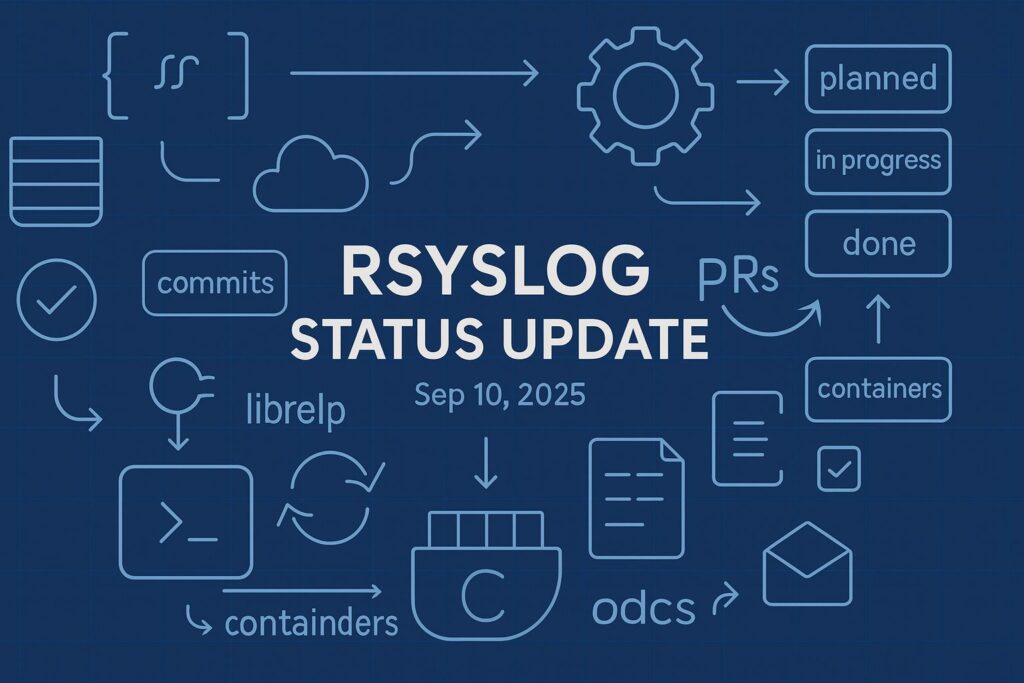Time goes fast, it is Sep 10 already. Mid August I said we will do a great refactoring of omhttp within a week or two. Well, that did not work out as planned. We still made solid progress, but more pressing work put it on hold for a bit. Time for a small update of what is happening in rsyslog.

What changed since Aug 26
- We shipped v8.25.0 on Aug 26 as planned.
- Roughly 100 new commits already landed in daily stable since then!
- Around 150 old issues were revisited and closed, some as implemented feature requests.
- About 10 long pending PRs were merged.
Short version: steady hands, lots of broom work, and a few shiny bits.
omhttp progress
The goal was a quick refactor sprint. Reality voted otherwise. I underestimated a few edges, but the main reason is that other work had higher priority. We paused new additions so we can put the already implemented pieces through a proper practice drill inside our containerization effort. If you want the background and the planned shape, it is all in the mid August post.
CI and tooling
I took a detour into CI. Newer runners and compilers, better coverage handling, and more reliable signals. This lines up with the expectations I set in late August: quick maintainer look, clear gates, no mass closes. It is not flashy, but it pays off every single day.
librelp and GCC 15
librelp did not build cleanly with GCC 15 where C23 is now the default. I fixed that and updated its CI while I was there. Outcome: clean builds and fewer landmines for downstreams.
Backlog, issues, and PRs
We kept working through older tickets. Quite a few closed for good reasons, some turned into implemented feature requests. I am grateful that many PR authors stayed with us and came back to finish their work after months, one even after years of me being the bottleneck. Thank you. The process matches what I wrote in late August.
A complex issue that was not
I chased a “tricky” crash again. It looked like deep concurrency. It was a missing state update. The useful bit is the lesson: tighten contracts, add tiny deterministic tests, and verify assumptions before hunting ghosts.
Guardrails, still friendly
We continue to see the occasional odd PR pattern. The approach stays friendly first with light automation and clear rules. That keeps the bar welcoming and protects the project at the same time. I described the guardrails and the small welcome workflow in more detail here.
Focus drifts to project containers
Focus slowly drifts toward optimizing our project provided containers. Goals: predictable defaults, smaller delta between dev and prod, and clearer guidance. This ties directly to the omhttp work and CI reliability. If you have container HTTP output edge cases, please send them. Partial accept and retry behavior are especially interesting.
Infrastructure note
We are also setting up new infrastructure. Thanks to DigitalOcean for their continuous sponsorship, which makes this much easier. We even have a small helper issue to prep fresh Droplets for our test and staging work. Much appreciated.
Docs and AI assistants
Doc restructuring continues with near daily commits. Smaller pages, clearer parameter docs, and a structure that is friendly to both humans and AI helpers. We also added more AI assistants behind the scenes. I will introduce them once the dust settles. Promise to keep the jokes human.
What is next
- Finish and merge the remaining
omhttpbits, then document good defaults and migration notes. - Land the remaining CI cleanups and keep coverage useful, not noisy.
- Keep the steady cadence on old issues and PRs.
- Harden and document the project containers.
- Continue the doc split ups and metadata cleanups.
